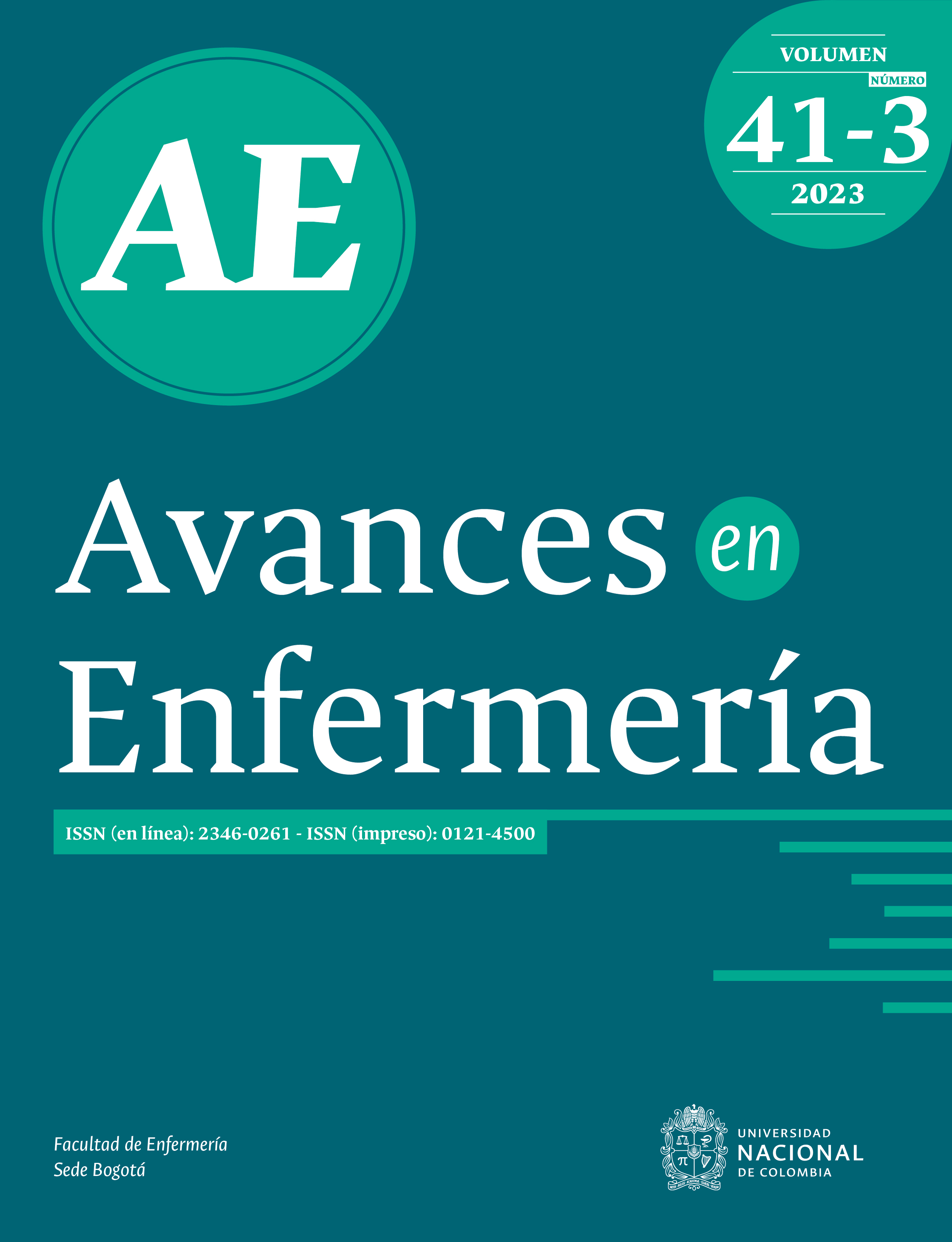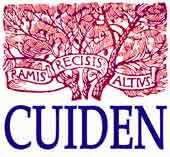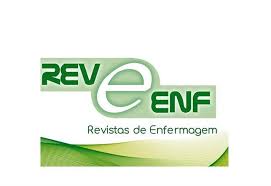El cuidador familiar de personas con ataque cerebrovascular: revisión de alcance
The family caregiver of people with stroke: A scoping review
O cuidador familiar de pessoas com acidente vascular cerebral: revisão de escopo
DOI:
https://doi.org/10.15446/av.enferm.v41n3.105002Palabras clave:
Cuidadores, Cuidadores Familiares, Accidente Cerebrovascular, Calidad de Vida, Apoyo Social (es)Caregivers, Family Caregivers, Stroke, Quality of Life, Social Support (en)
Cuidadores, Cuidadores Familiares, Acidente Vascular Cerebral, Qualidade de Vida, Apoio Social (pt)
Descargas
Objetivo: describir el estado actual de la evidencia científica sobre cuidadores familiares (CF) de personas con ataque cerebrovascular (ACV ).
Síntesis de contenido: se realizó una revisión descriptiva de alcance en las bases de datos Embase, PubMed, SciELO y Scopus, en idiomas inglés, español y portugués, acotada al periodo comprendido entre 2014 y el primer trimestre de 2023. Se utilizaron los términos MeSH y los operadores booleanos en la siguiente ecuación: caregivers OR family nursing OR family caregiving AND stroke AND nursing. Después del proceso de crítica con CASP-e, se seleccionaron 82 artículos. Con base en la información de estos artículos, se identificaron cuatro núcleos temáticos: i) condiciones y necesidades del CF de una persona con ACV ; ii) experiencia de cuidar y su impacto en el CF; iii) necesidad de soporte social, acompañamiento y espiritualidad para el bienestar del CF y iv) estrategias de enfermería para mejorar las condiciones generales del CF de una persona con ACV.
Conclusiones: las necesidades de los CF de personas con ACV se centran en aspectos como soporte social, acompañamiento y espiritualidad, evidenciado en variables como depresión, sobrecarga del cuidador y calidad de vida. Dentro de las oportunidades de generación de nuevo conocimiento se encuentran las relacionadas con el diseño de intervenciones de enfermería para la formación del cuidador que mejoren su calidad de vida.
Objective: To describe the current state of scientific evidence on family caregivers (FC) of people with cerebral vascular accident (CVA).
Content synthesis: Descriptive scope review conducted in the databases Embase, PubMed, SciELO and Scopus, including papers written in English, Spanish and Portuguese
and published in 2014 and during the first quarter of 2023. Mesh terms were use and Boolean operators in the following equation: caregivers OR family nursing OR family caregiving AND stroke AND nursing. After the review process with CASP-e, 82 articles were selected, addressing four main thematic nuclei: i) conditions and needs of the FC of a person with stroke, ii) the experience of caring and its impact on the FC, iii) the need for social support, accompaniment and spirituality for the well-being of the FC, and iv) nursing strategies to improve the general FC conditions of a person with stroke.
Conclusions: The needs of FC of people with stroke are mainly related to aspects such as social support, accompaniment, and spirituality, as evidenced in variables such as depression, caregiver burden and quality of life. Our findings show that design of nursing interventions for caregiver training aimed at improving their quality of life emerge as opportunities for generating new knowledge on the subject.
Objetivo: descrever o estado atual das evidências científicas sobre cuidadores familiares (CF) de pessoas com acidente vascular cerebral (AVC).
Síntese do conteúdo: foi realizada uma revisão de escopo descritiva nas bases de dados Embase, PubMed, SciELO e Scopus em inglês, espanhol e português, limitada ao período entre 2014 e primeiro trimestre 2023. Foram utilizados termos MeSH e operadores booleanos a seguir equação: caregivers OR family nursing OR family caregiving AND stroke AND nursing. Após o processo de revisão junto ao CASP-e, foram selecionados 82 artigos. Emergiram quatro núcleos temáticos: i) condições e necessidades do CF da pessoa com AVC, ii) a experiência de cuidar e seu impacto no CF, iii) a necessidade de apoio social, acompanhamento e espiritualidade para o bem-estar da pessoa CF e iv) estratégias de enfermagem para melhorar as condições gerais de CF de uma pessoa com AVC.
Conclusões: em geral, as necessidades de CF das pessoas com AVC concentram-se em aspectos como suporte social, acompanhamento e espiritualidade, evidenciados em variáveis como depressão, sobrecarga do cuidador e qualidade de vida. Entre as oportunidades de geração de novos conhecimentos estão aquelas relacionadas ao desenho de intervenções de enfermagem para a formação de cuidadores que melhorem sua qualidade de vida.
Referencias
(1) World Health Organization (WHO). The top 10 causes of death. WHO. Geneva; 2020. https://bit.ly/46FsW6N
(2) Red Colombiana contra el ataque cerebral. Estadísticas ACV: conoce la incidencia y los factores de riesgo. RecaVar; 2022. https://www.recavar.org/estadisticas-acv
(3) Feigin VL; Brainin M; Norrving B; Martins S; Sacco RL; Hacke W et al. World Stroke Organization (WSO ): Global Stroke Fact Sheet 2022. Int J Stroke. 2022;17(1):18-29. https://doi.org/10.1177/17474930211065917
(4) Sacco RL; Kasner SE; Broderick JP; Caplan LR; Connors JJ; Culebras A et al. An updated definition of stroke for the 21st Century: A statement for healthcare professionals from the American Heart Association/American Stroke Association. 2013;44(7):2064-2089. http://doi.org/10.1161/STR.0b013e318296aeca
(5) Feigin VL. Anthology of stroke epidemiology in the 20th and 21st centuries: Assessing the past, the present, and envisioning the future. Int J Stroke. 2019;14(3):223-237. https://doi.org/10.1177/1747493019832996
(6) Aboderin I; Venables G. Stroke management in Europe. J Intern Med. 1996;240(4):173-180. https://doi.org/10.1046/j.1365-2796.1996.39861000.x
(7) Helms J; Tacquard C; Severac F; Leonard-Lorant I; Ohana M; Delabranche X et al. High risk of thrombosis in patients with severe SARS -CoV-2 infection: A multicenter prospective cohort study. Intensive Care Med. 2020;46:1089-1098. https://doi.org/10.1007/s00134-020-06062-x
(8) Klok FA; Kruip MJHA; Van der Meer NJM; Arbous MS; Gommers D; Kant KM et al. Confirmation of the high cumulative incidence of thrombotic complications in critically ill ICU patients with COVID -19: An updated analysis. Thromb Res. 2020;191: 148-150. https://doi.org/10.1016/j.thromres.2020.04.041
(9) Lodigiani C; Iapichino G; Carenzo L; Cecconi M; Ferrazzi P; Sebastian T et al. Humanitas COVID -19 Task Force. Venous and arterial thromboembolic complications in COVID -19 patients admitted to an academic hospital in Milan, Italy. Thromb Res. 2020;191:9-14. https://doi.org/10.1016/j.thromres.2020.04.024
(10) Mao L; Jin H; Wang M; Hu Y; Chen S; He Q et al. Neurologic manifestations of hospitalized patients with coronavirus disease 2019 in Wuhan, China. JAMA Neurol. 2020;77(6):683-690. https://doi.org/10.1001/jamaneurol.2020.1127
(11) Ortega-Perez S; Sanchez-Rubio L; De las Salas R; Borja-Gonzalez J. An international perspective of transition of neurological disease: The Latin American and the Caribbean region. Nurs Clin N Am. 2019;54(3):449-456. https://doi.org/10.1016/j.cnur.2019.04.012
(12) Arias-Rojas M; Barrera-Ortiz L; Carrillo-González M; Chaparro-Díaz L; Sánchez-Herrera B; Vargas-Rosero E. Cuidadores familiares de personas con enfermedad crónica en las regiones de frontera colombiana: perfil y carga percibida de cuidado. Rev Fac Med. 2014;62(3):387-397. https://doi.org/10.15446/revfacmed.v62n3.39091
(13) Concejo de Medellín. Acuerdo 27 de 2015, Gaceta oficial. 2015;4340. https://bit.ly/3LUiZK0
(14) Herrera A; Flórez IE; Romero E; Montalvo A. Soporte social a cuidadores familiares de personas con enfermedad crónica en Cartagena. Aquichan. 2012;12(3):286-297. http://doi.org/10.5294/aqui.2012.12.3.7
(15) Luxardo N; Tripodoro V; Funes M; Berenguer C; Nastasi R; Veloso V. Perfil de cuidadores de enfermos en cuidados paliativos. Medicina B. Aires. 2009;69(5):519-525. https://bit.ly/3QekRAa
(16) Alvarado García AM. Experiencia de cuidar a un paciente con enfermedad crónica después de recibir una capacitación. Salud Uninorte. 2010;26(2):232-249. https://bit.ly/45sPLZG
(17) Flores GE; Rivas RE; Seguel PF. Nivel de sobrecarga en el desempeño del rol del cuidador familiar de adulto mayor con dependencia severa. Cienc. Enferm. 2012;18(1):29-41. http://doi.org/10.4067/S0717-95532012000100004
(18) Espinoza Godoy KA. Principales necesidades de cuidados de enfermería en cuidadores familiares de adultos mayores postrados [Tesis de enfermería]. Chile: Universidad Austral de Chile; 2010. http://cybertesis.uach.cl/tesis/uach/2010/fme.77p/doc/fme.77p.pdf
(19) Dou DM; Huang LL; Dou J; Wang XX; Wang PX. Post-stroke depression as a predictor of caregivers burden of acute ischemic stroke patients in China. Psychol Health Med. 2018;23(5):541-547. https://doi.org/10.1080/13548506.2017.1371778
(20) Pucciarelli G; Buck HG; Barbaranelli C; Savini S; Simeone S; Juarez-Vela R et al. Psychometric characteristics of the Mutuality Scale in stroke patients and caregivers. Gerontologist. 2016;56(5):e89-e98. https://doi.org/10.1093/geront/gnw083
(21) Em S; Bozkurt M; Caglayan M; Cevik FC; Kaya C; Oktayoglu P et al. Psychological health of caregivers and association with functional status of stroke patients. Top Stroke Rehabil. 2017;24(5):323-329. https://doi.org/10.1080/10749357.2017.1280901
(22) Peters MDJ; Godfrey CM; Khalil H; McInerney P; Parker D; Soares CB. Guidance for conducting systematic scoping reviews. Int J Evid Based Healthc. 2015;13(3):141-146. http://doi.org/10.1097/XEB.0000000000000050
(23) Cabello JB. Plantilla para ayudarte a entender una Revisión Sistemática. En: CASPe (Critical Appraisal Skills Programme Español). Alicante: CASPe; 2005. Cuaderno 1:13-17. http://www.redcaspe.org/plantilla_revision.pdf
(24) Burns SP; Lutz BJ; Magwood GS. ‘Timing it Right’: needs of African American adults with stroke and their caregivers across the care continuum. Ethn Health. 2019;27(2):420-434. https://doi.org/10.1080/13557858.2019.1693512
(25) Abu M; Arafat R; Syahrul S. The readiness of family in treating poststroke patients at home: A literature review. Enferm Clin. 2020;30(suppl 2):293-296. https://doi.org/10.1016/j.enfcli.2019.07.106
(26) Ganapathy V; Graham GD; DiBonaventura MD; Gillard PJ; Goren A; Zorowitz RD. Caregiver burden, productivity loss, and indirect costs associated with caring for patients with poststroke spasticity. Clin Interv Aging. 2015;10:1793-1802. https://doi.org/10.2147/CIA.S91123
(27) Caregiver Action Network. Caregiving Statistics; 2012. https://bit.ly/3tBVjUo
(28) Tsai PC; Yip PK; Tai JJ; Lou MF. Needs of family caregivers of stroke patients: a longitudinal study of caregivers’ perspectives. Pat Prefer Adh. 2015;9:449-457. https://doi.org/10.2147/PPA.S77713
(29) Farahani MA; Bahloli S; JamshidiOrak R; Ghaffari F. Investigating the needs of family caregivers of older stroke patients: A longitudinal study in Iran. BMC Geriatr. 2020;20:313. https://doi.org/10.1186/s12877-020-01670-0
(30) Araújo O; Lage I; Cabrita J; Teixeira L. Development and psychometric properties of EC PICID-AVC to measure informal caregivers’ skills when caring for older stroke survivors at home. Scand J Caring Sci. 2016;30(4):821-829. https://doi.org/10.1111/scs.12291
(31) Pindus DM; Mullis R; Lim L; Wellwood I; Rundell AV; Abd Aziz NA et al. Stroke survivors’ and informal caregivers’ experiences of primary care and community healthcare services - A systematic review and meta-ethnography. PLoS One. 2018;13(4): e0196185. https://doi.org/10.1371/journal.pone.0192533
(32) Liu JJ; Liu Q; Huang Y; Wang W; He G; Zeng Y. Effects of personal characteristics, disease uncertainty and knowledge on family caregivers’ preparedness of stroke survivors: A cross-sectional study. Nurs Health Sci. 2020;22(4):892-902. https://doi.org/doi:10.1111/nhs.12743
(33) Pitthayapong S; Thiangtam W; Powwattana A; Leelacharas S; Waters CM. A community based program for family caregivers for post stroke survivors in Thailand. Asian Nurs Res. 2017;11(2):150-157. https://doi.org/10.1016/j.anr.2017.05.009
(34) Camak DJ. Addressing the burden of stroke caregivers: A literature review. J Clin Nurs. 2015;24(17-18):2376-2382. https://doi.org/10.1111/jocn.12884
(35) Caro CC; Costa JD; Cruz DMC. Burden and quality of life of family caregivers of stroke patients. Occup Ther Health Care. 2018;32(2):154-171. https://doi.org/10.1080/07380577.2018.1449046
(36) Haley WE; Roth DL; Hovater M; Clay OJ. Long-term impact of stroke on family caregiver well-being: A population-based case-control study. Neurology. 2015;84(13):1323-1329. https://doi.org/10.1212/WNL.0000000000001418
(37) Hultman MT; Everson-Rose SA; Tracy MF; Lindquist R; Hadidi NN. Associations between characteristics of stroke survivors and caregiver depressive symptoms: A critical review. Top Stroke Rehabil. 2019;26(7):528-537. https://doi.org/10.1080/10749357.2019.1641010
(38) Bierhals CCBK; Low G; Paskulin LMG. Quality of life perceptions of family caregivers of older adults stroke survivors: A longitudinal study. Appl Nurs Res. 2019;47:57-62. https://doi.org/10.1016/j.apnr.2019.05.003
(39) Khalid W; Rozi S; Ali TS; Azam I; Mullen MT; Illyas S et al. Quality of life after stroke in Pakistan. BMC Neurology. 2016;16(250):1-12. https://doi.org/10.1186/s12883-016-0774-1
(40) Silva IFG; Neves CFS; Vilela ACG; Bastos LMD; Henriques MILS. Viver e cuidar após o acidente vascular cerebral. Enf Ref. 2016;4(8):103-111. https://doi.org/10.12707/riv15047
(41) Watanabe A; Fukuda M; Suzuki M; Kawaguchi T; Habata T; Akutsu T et al. Factors decreasing caregiver burden to allow patients with cerebrovascular disease to continue in long-term home care. J Stroke Cerebrovas Dis. 2015;24(2):424-430. https://doi.org/10.1016/j.jstrokecerebrovasdis.2014.09.013
(42) Zhu W; Jiang Y. A meta-analytic study of predictors for informal caregiver burden in patients with stroke. J Stroke Cerebrovas Dis. 2018;27(12):3636-3646. https://doi.org/10.1016/j.jstrokecerebrovasdis.2018.08.037
(43) Costa TF; Pimenta CJL; Nóbrega MML; Fernandes MGM; França ISX; Pontes MLF et al. Burden on caregivers of patients with sequelae of cerebrovascular accident. Rev Bras Enferm. 2020;73(6):e20180868. https://doi.org/10.1590/0034-7167-2018-0868
(44) Jaracz K; Grabowska-Fudala B; Górna K; Jaracz J; Moczko J; Kozubski W. Burden in caregivers of long-term stroke survivors: Prevalence and determinants at 6 months and 5 years after stroke. Patient Educ Couns. 2015;98(8):1011-1016. https://doi.org/10.1016/j.pec.2015.04.008
(45) Reeves MJ; Fritz MC; Woodward AT; Hughes AK; Coursaris CK; Swierenga SJ et al. Michigan stroke transitions trial: A clinical trial to improve stroke transitions. Circ Cardiovasc Qual Outcomes. 2019;12(7):5493. https://doi.org/10.1161/CIRCOUTCOMES.119.005493
(46) Hekmatpou D; Mohammad BE; Mardanian DL. The effect of patient care education on burden of care and the quality of life of caregivers of stroke patients. J Multidiscip Healthcare. 2019;12:211-217. https://doi.org/10.2147/JMDH.S196903
(47) Dou DM; Huang LL; Dou J; Wang XX; Wang PX. Post-stroke depression as a predictor of caregivers burden of acute ischemic stroke patients in China. Psychol Health Med. 2018;23(5):541-547. https://doi.org/10.1080/13548506.2017.1371778
(48) Graf R; LeLaurin J; Schmitzberger M; Freytes IM; Orozco T; Dang S et al. The stroke caregiving trajectory in relation to caregiver depressive symptoms, burden, and intervention outcomes. Top Stroke Rehabil. 2017;24(7):488-495. https://doi.org/10.1080/10749357.2017.1338371
(49) Azizi A; Khatiban M; Mollai Z; Mohammadi Y. Effect of informational support on anxiety in family caregivers of patients with hemiplegic stroke. J Stroke Cerebrovas Dis. 2020;29(9):105020. https://doi.org/10.1016/j.jstrokecerebrovasdis.2020.105020
(50) Goudarzian M; Fallahi-Khoshknab M; Dalvandi A; Delbari A; Biglarian A. Effect of telenursing on levels of depression and anxiety in caregivers of patients with stroke: A randomized clinical trial. Iran J Nurs Midwifery Res. 2018;23:248-252. http://doi.org/10.4103/ijnmr.IJNMR_242_16
(51) Mei Y; Wilson S; Lin B; Li Y; Zhang Z. Benefit finding for Chinese family caregivers of community-dwelling stroke survivors: A crosssectional study. J Clin Nurs. 2018;27(7-8):1419-1428. https://doi.org/10.1111/jocn.14249
(52) Cheng HY; Chair SY; Chau JPC. Effectiveness of a strength-oriented psychoeducation on caregiving competence, problem-solving abilities, psychosocial outcomes and physical health among family caregiver of stroke survivors: A randomised controlled trial. Inter J Nur Stud. 2018;87:84-93. https://doi.org/10.1016/j.ijnurstu.2018.07.005
(53) Souter C; Kinnear A; Kinnear M; Mead G. Optimisation of secondary prevention of stroke: A qualitative study of stroke patients’ beliefs, concerns and difficulties with their medicines. Int J Pharm Pract. 2014;22(6):424-432. https://doi.org/10.1111/ijpp.12104
(54) Stone K. Enhancing preparedness and satisfaction of caregivers of patients discharged from an inpatient rehabilitation facility using an interactive website. Rehabilitation Nurs. 2014;39(2):76-85. https://doi.org/10.1002/rnj.123
(55) Cameron JI; Naglie G; Green TL; Gignac MAM; Bayley M; Huijbregts M et al. A feasibility and pilot randomized controlled trial of the “Timing it Right Stroke Family Support Program”. Clin Rehabil. 2015;29(11):1129-1140. https://doi.org/10.1177/0269215514564897
(56) Ugur HG; Erci B. The effect of home care for stroke patients and education of caregivers on the caregiver burden and quality of life. Acta Clin Croat. 2019;58(2):321-332. https://doi.org/10.20471/acc.2019.58.02.16
(57) Gibbs LAL; Anderson MI; Simpson GK; Jones KF. Spirituality and resilience among family caregivers of survivors of stroke: A scoping review. NeuroRehabilitation. 2020;46(1):41-52. https://doi.org/10.3233/NRE-192946
(58) Celich KLS; Maschio G; Silva Filho CC; Silva TG; Souza SS. Influence of family support in burden of caregivers of individuals with cerebrovascular accident sequelae. Inv Edu Enfer. 2016; 34(3):544-550. https://doi.org/10.17533/udea.iee.v34n3a14
(59) Malini MH. Impact of support group intervention on family system strengths of rural caregivers of stroke patients in India. Aust J Rural Health. 2015;23(2):95-100. https://doi.org/10.1111/ajr.12126
(60) Araújo O; Lage I; Cabrita J; Teixeira L. Training informal caregivers to care for older people after stroke: A quasi-experimental study. J Adv Nurs. 2018;74(9):2196-2206. https://doi.org/10.1111/jan.13714
(61) Wu X; Liang Y; Zheng B; Wang H; Ning M; Zheng H et al. Care stress in caregivers of disabled stroke patients: A cross-sectional survey. Ann Palliative Med. 2020;9(4):33-40. https://doi.org/10.21037/apm-20-1369
(62) Zhu W; Jiang Y. Determinants of caregiver burden of patients with haemorrhagic stroke in China. Intern J Nurs Prac. 2019;25(2):e12719. https://doi.org/10.1111/ijn.12719
(63) Ferguson L; Perera A; Farhad M; Parwaiz A; Stutzman SE. Alleviating care partner poststroke stress through education. J Neurosci Nurs. 2020;52(3):117-121. https://doi.org/10.1097/JNN.0000000000000510
(64) WHOQOL SRPB Group. A cross-cultural study of spirituality, religion, and personal beliefs as components of quality of life. Soc Sci Med. 2006;62(6):1486-1497. https://doi.org/10.1016/j.socscimed.2005.08.001
(65) Byun E; Evans L; Sommers M; Tkacs N; Riegel B. Depressive symptoms in caregivers immediately after stroke. Top stroke rehab. 2019;26(3):187-194. https://doi.org/10.1080/10749357.2019.1590950
(66) Torabi CR; Navabi N; Shamsalinia A; Ghaffari F. The relationship between the spiritual attitude of the family caregivers of older patients with stroke and their burden. Clin intervent aging. 2017;12:453-458. https://doi.org/10.2147/CIA.S121285
(67) Kes D; Yildirim TA. The relationship of religious coping strategies and family harmony with caregiver burden for family members of patients with stroke. Brain Injury. 2020;34(11):1461-1466. https://doi.org/10.1080/02699052.2020.1810317
(68) Pucciarelli G; Vellone E; Bolgeo T; Simeone S; Alvaro R; Lee CS et al. Role of spirituality on the association between depression and quality of life in stroke survivor–Care partner dyads. 2020;13(6):6129. https://doi.org/10.1161/CIRCOUTCOMES.119.006129
(69) Pucciarelli G; Ausili D; Galbussera AA; Rebora P; Savini S; Simeone S et al. Quality of life, anxiety, depression and burden among stroke caregivers: A longitudinal, observational multicentre study. J Advanc Nurs. 2018;74(8):1875-1887. https://doi.org/10.1111/jan.13695
(70) Pucciarelli G; Lyons K; Simeone S; Lee CS; Vellone E; Alvaro R. Moderator role of mutuality on the association between depression and quality of life in stroke survivor-caregiver dyads. J Cardiovasc Nurs. 2021;36(3):245-253. https://doi.org/10.1097/JCN.0000000000000728
(71) Costa TF; Gomes TM; Viana LRC; Martins KP; Macêdo-Costa KNF. Stroke: Patient characteristics and quality of life of caregivers. Rev Bras Enferm. 2016;69(5):877-883. http://doi.org/10.1590/0034-7167-2015-0064
(72) Bunketorp-Käll L; Lundgren-Nilsson A; Nilsson M; Blomstrand C. Multimodal rehabilitation in the late phase after stroke enhances the life situation of informal caregivers. Top Stroke Rehab. 2018;25(3):161-167. https://doi.org/10.1080/10749357.2017.1413761
(73) Van Dijk M; Vreven J; Deschodt M; Verheyden G; Tournoy J; Flamaing J. Can in-hospital or post discharge caregiver involvement increase functional performance of older patients? A systematic review. BMC Geriatr. 2020;20:362. https://doi.org/10.1186/s12877-020-01769-4
(74) Blanton S; Dunbar S; Clark PC. Content validity and satisfaction with a caregiver-integrated web-based rehabilitation intervention for persons with stroke. Top Stroke rehabil. 2018;25(3):168-173. https://doi.org/10.1080/10749357.2017.1419618
(75) Ferrell BR; Kravitz K; Borneman T; Friedmann ET. Family caregivers: A qualitative study to better understand the quality-of-Life concerns and needs of this population. Clin J Oncol Nurs. 2018;22(3):286-294. http://doi.org/10.1188/18.CJON.286-294
(76) Aadal L; Angel S; Langhorn L; Pedersen BB; Dreyer P. Nursing roles and functions addressing relatives during in-hospital rehabilitation following stroke. Care needs and involvement. Scandinavian J Caring Sci. 2017;32(2):871-879. https://doi.org/10.1111/scs.12518
(77) Bakas T; Austin JK; Habermann B; Jessup NM; McLennon SM; Mitchell PH et al. Telephone assessment and skill-building kit for stroke caregivers: A randomized controlled clinical trial. Stroke. 2015;46(12):3478-3487. https://doi.org/10.1161/STROKEAHA.115.011099
(78) Day CB; Bierhals CCBK; Santos NO; Mocellin D; Predebon ML; Dal Pizzol FLF et al. Nursing home care educational intervention for family caregivers of older adult’s post stroke (SHARE ): Study protocol for a randomised trial. Trials. 2018;19:96. https://doi.org/10.1186/s13063-018-2454-5
(79) Abu M; Arafat R; Syahrul S. The readiness of family in treating post-stroke patients at home: A literature review. Enferm Clín. 2020;30(Suppl 2):293-2 296. https://doi.org/10.1016/j.enfcli.2019.07.106
(80) Dharma KK; Damhudi D; Yardes N; Haeriyanto S. Increase in the functional capacity and quality of life among stroke patients by family caregiver empowerment program based on adaptation model. Inter J Nurs Sci. 2018;5(4):357-364. https://doi.org/10.1016/j.ijnss.2018.09.002
(81) Fens M; Heugten CM; Beusmans G; Metsemakers J; Kester A; Limburg M. Effect of a stroke-specific follow-up care model on the quality of life of stroke patients and caregivers: A controlled trial. J Reh Med. 2013;46(1):7-15. https://doi.org/10.2340/16501977-1239
(82) Shyu YIL; Kuo LM; Chen MC; Chen ST. A clinical trial of an individualised intervention programme for family caregivers of older stroke victims in Taiwan. J Clin Nurs. 2010;19(11-12):1675-1685. https://doi.org/10.1111/j.1365-2702.2009.03124.x
(83) Forster A; Young J; Chapman K; Nixon J; Patel A; Holloway I et al. Cluster randomized controlled trial: Clinical and cost-effectiveness of a system of longer-term stroke care. Stroke. 2015;46(8):2212-2219. https://doi.org/10.1161/strokeaha.115.008585
(84) Drummond M; Johnston B; Quinn TJ. Measuring the success of interventions for caregivers: A focussed systematic review. Curr Opin Support Palliat Care. 2019;13(4):351-359. https://doi.org/10.1097/SPC.0000000000000461
(85) Ostwald SK; Godwin KM; Cron SG; Kelley CP; Hersh G; Davis S. Home-based psychoeducational and mailed information programs for stroke-caregiving dyads post-discharge: A randomized trial. Disabil Rehabil. 2014;36(1):55-62. https://doi.org/10.3109/09638288.2013.777806
(86) Forster A; Dickerson J; Young J; Patel A; Kalra L; Nixon J et al. A cluster randomised controlled trial and economic evaluation of a structured training programme for caregivers of inpatients after stroke: The TRACS trial. Health Technol Assess. 2013;17(46):1-8. https://doi.org/10.3310/hta17460
(87) Wan-Fei K; Hassan STS; Sann LM; Ismail SIF; Raman RA; Ibrahim F. Depression, anxiety and quality of life in stroke survivors and their family caregivers: A pilot study using an actor/partner interdependence model. Electronic Physician. 2017;9(8):4924-4933. https://doi.org/10.19082/4924
(88) Smith GC; Egbert N; Dellman-Jenkins M; Nanna K; Palmieri PA. Reducing depression in stroke survivors and their informal caregivers: A randomized clinical trial of a web-based intervention. Rehabil Psychol. 2012;57(3):196-206. https://doi.org/10.1037/a0029587
(89) Forster A; Young J; Green J; Patterson C; Wanklyn P; Smith J et al. Structured re-assessment system at 6 months after a disabling stroke: A randomised controlled trial with resource use and cost study. Age Ageing. 2009;38(5):576-583. https://doi.org/10.1093/ageing/afp095
(90) Simeone S; Coehn MZ; Savini S; Pucciarelli G; Alvaro R; Vellone E. Il vissuto esperenziale dei caregiver di soggetti sopravissuti ad ictus tre mesi dopo la dimissione dei pazienti da un istituto di riabilitazione. Prof Inferm. 2016;69(2):103-112. https://pubmed.ncbi.nlm.nih.gov/27600551/
(91) Marsden D; Quinn R; Pond N; Golledge R; Neilson C; White J et al. A multidisciplinary group programme in rural settings for communitydwelling chronic stroke survivors and their carers: A pilot randomized controlled trial. Clin Rehabil. 2010;24(4):328-341. https://doi.org/10.1177/0269215509344268
(92) Wang TC; Tsai AC; Wang JY; Lin YT; Lin KL; Chen JJ et al. Caregivermediated intervention can improve physical functional recovery of patients with chronic stroke: A randomized controlled trial. Neurorehabil Neural Repair. 2015;29(1):3-12. https://doi.org/10.1177/1545968314532030
(93) Carreño-Moreno S; Chaparro-Diaz L. Adopción del rol del cuidador familiar del paciente crónico: una herramienta para valorar la transición. Rev Invest Andina. 2018;20(36):39-54. https://doi.org/10.33132/01248146.968
(94) Chaparro-Díaz L. El vínculo especial de cuidado: construcción de una teoría fundamentada. Av. enferm. 2010;28(2):123-133. https://bit.ly/3tyBIo6
(95) Rodrigues RAP; Marques S; Kusumota L; Santos EB; Silva Fhon JR; Fabrício-Wehbe SCC. Transition of care for the elderly after cerebrovascular accidents - from hospital to the home. Rev Latino-Am Enferm. 2013;21(spe):216-224. https://doi.org/10.1590/S0104-11692013000700027
(96) Roth DL; Haley WE; Sheehan OC; Liu C; Clay OJ; Rhodes JD et al. Depressive symptoms after ischemic stroke: Population-based comparisons of patients and caregivers with matched controls. Stroke. 2020;51(1):54-60. https://doi.org/10.1161/STROKEAHA.119.027039
(97) Pucciarelli G; Vellone E; Savini S; Simeone S; Ausili D; Alvaro R et al. Roles of changing physical function and caregiver burden on quality of life in stroke: A longitudinal dyadic analysis. Stroke. 2017;48(3):733-739. https://doi.org/10.1161/STROKEAHA.116.014989
(98) Byun E; Riegel B; Sommers M; Tkacs N; Evans L. Caregiving immediately after stroke: A study of uncertainty in caregivers of older adults. J Neurosci Nurs. 2016;8(6):343-351. https://doi.org/10.1097/JNN.0000000000000238
(99) Mei Y; Lin B; Li Y; Ding C; Zhang Z. Effects of modified 8-week reminiscence therapy on the older spouse caregivers of stroke survivors in Chinese communities: A randomized controlled trial. Int J Geriatr Psychiatry. 2018;33(4):633-641. https://doi.org/10.1002/gps.4833
(100) Krieger T; Feron F; Dorant E. Developing a complex intervention programme for informal caregivers of stroke survivors: The Caregivers' Guide. Scand J Caring Sci. 2017;31(1):146-156. https://doi.org/10.1111/scs.12344
(101) Haley WE; Roth DL; Hovater M; Clay OJ. Long-term impact of stroke on family caregiver well-being: A population-based case-control study. Neurology. 2015;84(13):1323-1329. https://doi.org/10.1212/WNL.0000000000001418
(102) Tyagi S; Koh GCH; Luo N; Tan KB; Hoenig H; Matchar DB et al. Dyadic approach to supervised community rehabilitation participation in an Asian setting post-stroke: exploring the role of caregiver and patient characteristics in a prospective cohort study. BMJ Open. 2020;10(4):36631. https://doi.org/10.1136/bmjopen-2019-036631
(103) Pucciarelli G; Lommi M; Magwood GS; Simeone S; Colaceci S; Vellone E et al. Effectiveness of dyadic interventions to improve stroke patient–caregiver dyads’ outcomes after discharge: A systematic review and meta-analysis study. Eur J Cardiovasc Nurs. 2021;20(1):14-33. http://doi.org/10.1177/1474515120926069
(104) Rowat A; Pollock A; St George B; Cowey E; Booth J; Lawrence M. Top 10 research priorities relating to stroke nursing: a rigorous approach to establish a national nurse-led research agenda. J Adv Nurs. 2016;72(11):2831-2843. https://doi.org/10.1111/jan.13048
Cómo citar
VANCOUVER
ACM
ACS
APA
ABNT
Chicago
Harvard
IEEE
MLA
Turabian
Descargar cita
Licencia
Derechos de autor 2023 Fredy Duvan Tamayo Botero, Ángela María Salazar Maya, Edier Mauricio Arias Rojas

Esta obra está bajo una licencia internacional Creative Commons Atribución-NoComercial 4.0.
Todos los artículos publicados por Avances en Enfermería están licenciados bajo la Licencia Internacional Creative Commons Attribution 4.0. A partir del año 2020 adicionamos a la licencia el reconocimiento CC-BY-NC en la cual se permite a cualquier persona copiar, redistribuir, remezclar, transmitir y adaptar el trabajo de manera no comercial, y aunque sus nuevos trabajos deben citar adecuadamente la obra original y la fuente y deben ser no comerciales, no tienen que licenciar sus trabajos derivados en los mismos términos.




























